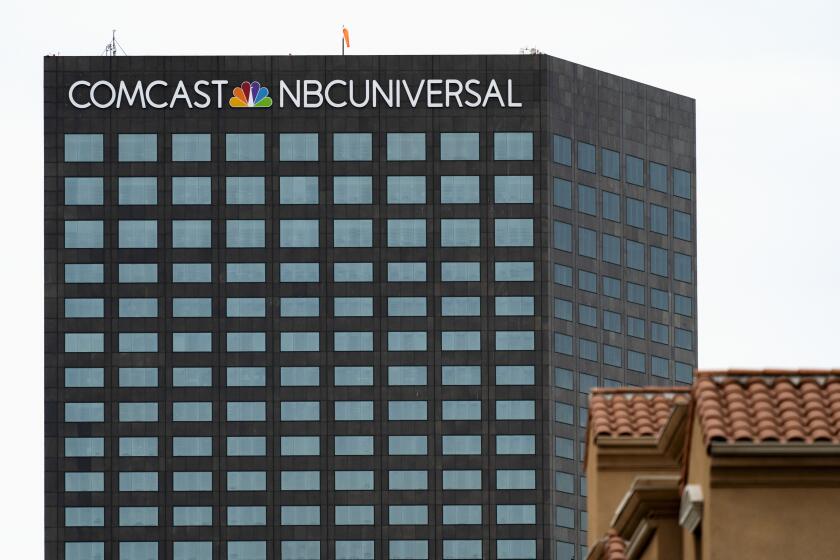Record labels want bigger cut of action
Many music industry executives facing a CD sales slump love the sound of Guitar Hero and Rock Band.
The video games have millions of followers who memorize every note of songs so they can jam along -- and they often buy the original version of their favorites. In addition to the publicity, the record labels get licensing fees from the game publishers.
But not all music industry executives are singing “Hallelujah.”
Edgar Bronfman Jr., chairman and chief executive of Warner Music Group, recently grumbled that the record labels deserved a bigger piece of the spoils from the games’ success.
“The amount being paid to the industry, even though their games are entirely dependent on the content that we own and control, is far too small,” he said during an Aug. 7 earnings call.
Bronfman suggested that he wanted Warner to be less a supplier than a partner. “If that does not become the case, as far as Warner Music is concerned, we will not license to those games,” he said.
The recording industry has long complained that it doesn’t receive its fair share of the proceeds from successful businesses built on music, such as MTV, the iPod and the iTunes store.
Apple Inc.’s products and MTV were “ecosystems [from which] people other than the recording industry have derived the majority of value created,” Bronfman said.
Such tensions often arise when new business models sprout in the digital world, said Colin Sebastian, an analyst with Lazard Capital Markets.
“Music publishers see music-based games as a growth opportunity in an otherwise struggling music business, and they’re trying to grab as much of that growth as they can,” he said.
There is a lot of money at stake. Sales of music-themed games should hit $1.5 billion this year and grow as much as 35% next year, according to analysts’ estimates.
But there are a lot of hands in the cookie jar, including those of game console makers such as Microsoft Corp. and Sony Corp.
Guitar Hero, which costs $50 to $100, is published by Santa Monica-based Activision Blizzard Inc. Since its debut in 2005, the game has sold 20 million copies and generated more than $1 billion in retail sales.
MTV Networks published Rock Band in 2007. The $170 game comes with a guitar controller, drum kit and microphone.
Both games involve mastering “playing” a song before moving to the next level.
The game publishers pay the record labels about $10,000 for the rights to re-record a song and up to about $25,000 for master recordings by the original artist or new releases, according to executives close to the negotiations. They spoke on condition of anonymity because the terms are confidential.
More recently, music companies have sought a royalty of 4 to 8 cents for each copy of a game sold.
Labels also sometimes see a resurgence of older music. “Same Old Song and Dance,” a 34-year-old Aerosmith tune, saw a 446% jump in downloads on iTunes and other online stores in the two months after its release on Guitar Hero 3, according to Tim Riley, vice president of music affairs at Activision Blizzard.
In some cases, sales of the game version of a song outsell those of the real thing. In the week after releasing its single “Saints of Los Angeles,” Motley Crue sold 47,000 copies of the Rock Band version for Xbox 360 while selling just 10,000 copies of the original song as a digital download.
“We get the content, and they get a financial royalty and the promotion and exposure for their bands,” Riley said.
Music industry executives declined to comment publicly. Some privately expressed surprise that Bronfman had spoken out, but said they too wanted better deals with game makers.
In a prepared statement, Warner said it had “enormous respect” for the investment and creativity of game publishers.
“We hope that our partners in the gaming space appreciate not only the value of their own contributions but also those of the recording artists, songwriters, record labels and music publishers on which their games are significantly based,” the company said.
Laura Martin, a senior media analyst at Soleil Securities Group, said she expected to see “more of the economics shared with the content creators.”
But IDC analyst Susan Kevorkian said the “major music labels need to reposition themselves as proactive players in developing digital music businesses rather than victims. They have a lot of power.”
Not as much as they once had. The games have moved from niche to phenomenon, and musicians want in.
“The number of people interested in being associated with the game is probably a thousand times more than we can get into the game,” Riley said.
“Our in-boxes are full with CDs every day.”
--
alex.pham@latimes.com
More to Read
The biggest entertainment stories
Get our big stories about Hollywood, film, television, music, arts, culture and more right in your inbox as soon as they publish.
You may occasionally receive promotional content from the Los Angeles Times.









